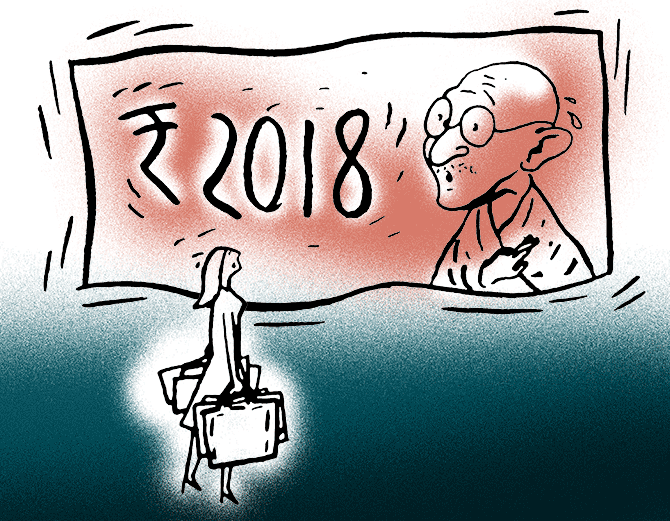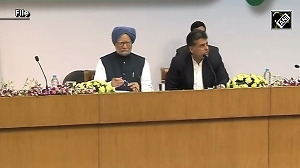'The best way to start is to understand your finances.'
'Keeping a tab on spending can help you invest more.'
Tinesh Bhasin finds out more.
Illustration: Dominic Xavier/Rediff.com

Making money in 2018 may not be as easy as the year that went by.
To tide over the volatility expected this year, it would be a good idea to make a few New Year resolutions and stick to them.
Most experts believe that investors need to tone down their returns expectations this year as markets may not continue to grow as they have in the past two years.
Even if you were not disciplined or organised, you would have still made money in the last two years.
The broader indices, Sensex and Nifty, rallied over 30 per cent in the last calendar year. The average return from equity mutual funds were even higher.
If returns are hard to come by this year, you would need to get organised, and not get swayed by sentiments.
"The best way to start is to understand your finances. Keeping a tab on spending, for example, can help you invest more. Consolidating investments can increase overall returns of the portfolio," says Suresh Sadagopan, Founder, Ladder 7 Financial Services.
Continue with your investments
According to data from Associations of Mutual Funds in India, only 34 per cent of equity investments are held for more than two years.
It just confirms the trend that majority of the investors come when markets are making new highs and rush to redeem their funds whenever there's a significant correction.
Systematic Investment Plans (SIP) help to create long-term wealth only if you continue to invest through the ups and downs of the market, by averaging the cost of purchase.
To see meaningful returns, an individual needs to remain invested over the long term.
This year, if the markets witness a correction or high volatility, resolve that you will not stop your SIPs or redeem funds.
On the contrary, increasing your SIP amount help your benefit from the correction.
Start with a budget and stick to it
Many salaried persons are aware of the salary that comes to their bank account. But they don't keep a tab on their spending.
Patna-based teacher Cheryl Sinha, for example, finds it cumbersome to maintain a note on every little expense.
A fixed amount from her salary goes towards investments in mutual funds via SIPs and Equated Monthly Instalment (EMI) for a consumer durable loan.
Whatever remains in her bank account after household expenses, she puts it in a fixed deposit.
Financial planners say that many individuals deal with their finances just like Sinha.
An easier way for them is to have two bank accounts.
"The primary can be used for fixed expenses like investments, children's fee and loan repayment," says Tarun Birani, founder and CEO, TBNG Capital Advisors.
They can transfer a fixed monthly amount to the second account for variable spends.
In a few months, they will be able to track their expenses more efficiently and budget accordingly.
They can then start with cutting down on expenses and allocating a higher amount to investments.
Organise your finances
You could have picked the right funds and intend to continue with your SIPs. But getting a little organised can help you enhance your returns.
Look at consolidating your investment portfolio.
Financial advisers say that investors keep adding funds to their portfolio either on the recommendation of friends or family or when they want to start saving for a new goal.
Delhi-based software developer Nitin Garg, for example, has a portfolio of 14 funds.
There are some, which he didn't redeem though he has stopped investing in them.
When his daughter was born, he started investing in two new schemes for her.
A portfolio should not have more than three large-cap, two mid- and small-caps and one or two sector funds with the bulk of investment (50 per cent or more) going towards large-caps.
Anything more can reduce returns due to over-diversification.
Prioritise debt
Most individuals understand that credit cards carry high interest rates. Despite this, many keep their dues outstanding.
Sample this: Suppose you have Rs 200,000 outstanding and you repay 50 per cent of the dues each month.
And you also continue to spend 25 per cent of the principal every month.
The repayment in the first month will be Rs 100,000 and it will reach zero in three years and one month.
The total interest you will end up paying is Rs 8,333 in the period.
Make a resolution to finish high-interest debt first and not take a loan for lifestyle products this year.
There are many options to clear your debt faster.
You can convert outstanding dues into EMI, take a personal loan or go for a balance transfer, if another card issuer is charging you lower interest rate.
If you have a high-interest personal loan, target to prepay it when you get an increment or bonus.
The interest cost that you save can be allocated to increase your monthly savings.
Be clear on virtual currencies
The spectacular returns from Bitcoin last year lured many investors to the world of cryptocurrencies.
Investors saw their investments grow 15 times in one year. The higher it rose in value, the more investors it attracted.
No one knows where cryptocurrencies will head hereafter, as there is no intrinsic value they carry. Their prices are driven only by sentiments.
That's why investment managers suggest that investors stay away from virtual currencies.
But for many, it's difficult not to get lured by the successful investment stories of others.
Ankit Gupta, a bank employee, wants to experiment and understand the world of cryptocurrencies.
In his family, some have seen Rs 100,000 investments becoming Rs 1.7 million.
But financial advisers say that one should invest only the amount that they are willing to lose as these currencies tend to see sharp corrections.
Whenever there is adverse news related to a cryptocurrency, a scam or a government clampdown, its price tends to fall.
In the past, bitcoin has declined over 50 per cent many times.
"If someone wants to invest because of the returns in the recent past, then it's a strict no," says Amar Pandit, founder, HappynessFactory.in.
"If they understand it and want to be in it for the long term, then they need to look at how it will fit in the overall portfolio."












 © 2024 Rediff.com -
© 2024 Rediff.com -